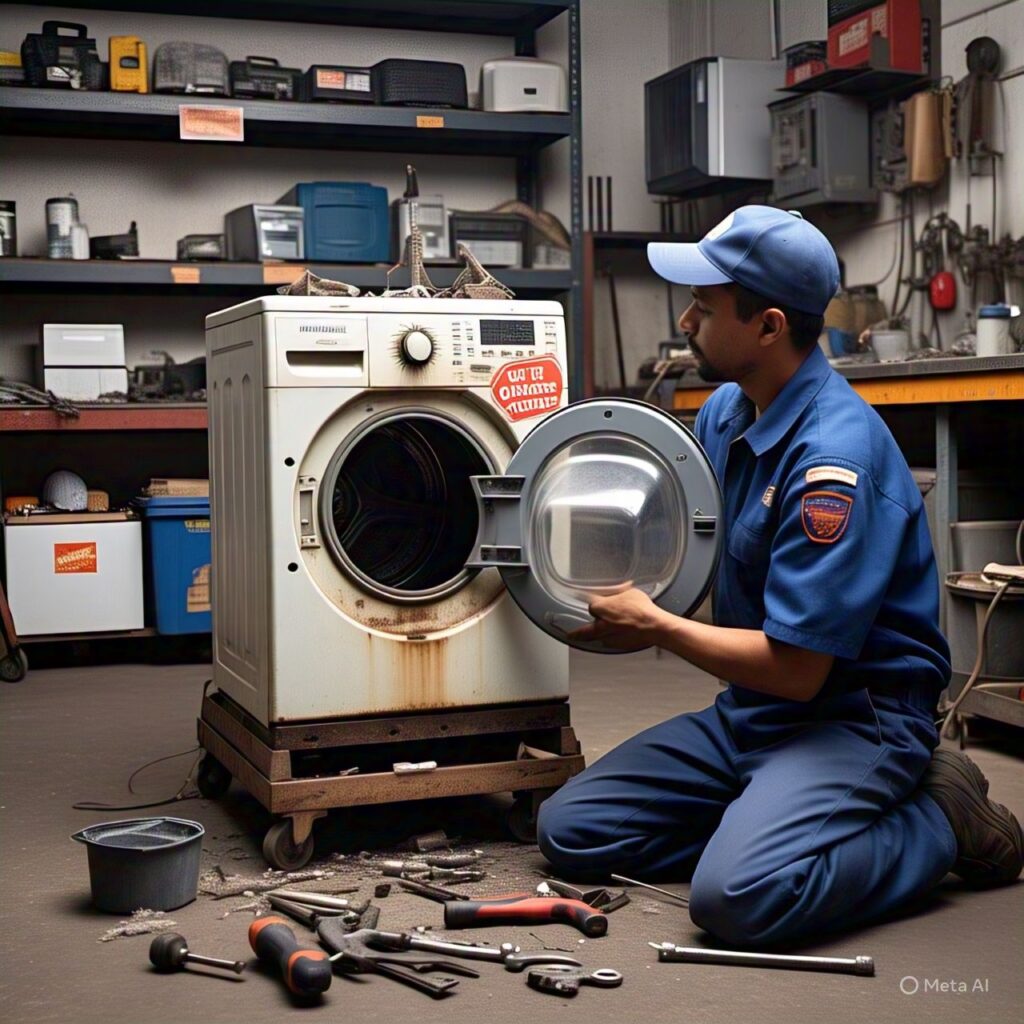
A washing machine is one of the most essential household appliances, helping to keep clothes clean and fresh with minimal effort. However, like any other machine, it can break down over time, leaving you with a laundry crisis. Understanding washing machine repair can save you money, time, and frustration. This article will explore common problems, repair solutions, preventive maintenance, and frequently asked questions about washing machine repair.
Why Washing Machines Break Down
Washing machines are complex appliances with many moving parts, electrical components, and water systems. Understanding the root causes of malfunction can help you determine whether a DIY fix is possible or if you need professional help.
1. Wear and Tear
Like all machines, washing machines experience wear and tear over years of use. Belts can loosen, motors can wear out, and hoses may develop leaks.
2. Overloading
Overloading the drum can strain the motor, bearings, and suspension, leading to premature damage.
3. Poor Maintenance
Neglecting regular cleaning or not checking for lint buildup and leaks can contribute to long-term damage.
Common Washing Machine Problems and How to Fix Them
1. Washing Machine Not Spinning
One of the most common issues is the drum not spinning, which can leave clothes soaking wet.
Possible Causes:
- Unbalanced load
- Faulty lid switch
- Broken drive belt
- Malfunctioning motor
Repair Tips:
- Check and redistribute the laundry.
- Inspect the lid switch for continuity.
- Replace a worn-out belt.
- Contact a technician for motor replacement.
2. Washing Machine Not Draining
Water left in the drum after a cycle is a frustrating issue.
Possible Causes:
- Clogged drain hose or pump
- Broken pump
- Faulty lid switch
Repair Tips:
- Clean the drain hose and filter.
- Listen for humming from the pump – if it’s silent, it may need replacement.
- Check the lid switch as some models won’t drain unless it’s functioning.
3. Excessive Vibration or Noise
A noisy or vibrating washing machine is not only annoying but also a sign something is wrong.
Possible Causes:
- Unbalanced load
- Worn suspension rods
- Uneven flooring
Repair Tips:
- Ensure even load distribution.
- Adjust the feet of the washing machine.
- Replace worn suspension parts if necessary.
4. Washing Machine Leaking Water
Leaks can damage floors and nearby furniture.
Possible Causes:
- Broken door seal
- Loose or damaged hoses
- Faulty water inlet valve
Repair Tips:
- Inspect and replace damaged hoses.
- Tighten hose connections.
- Replace the door seal or inlet valve if needed.
5. Washing Machine Not Turning On
If your machine doesn’t power up, it’s likely an electrical issue.
Possible Causes:
- Blown fuse or circuit breaker
- Faulty power cord
- Defective control board
Repair Tips:
- Check the home’s circuit breaker.
- Inspect the power cord for damage.
- Replace the control board with professional help.
When to Call a Professional for Washing Machine Repair
While some issues are easy to fix on your own, others require technical knowledge and tools. Here are signs you need professional washing machine repair:
- The motor or transmission needs replacement
- Electrical issues like faulty wiring or control board
- Persistent leaks that aren’t resolved with hose replacement
- Strange burning smells or smoke
Hiring a certified technician ensures safety and proper diagnosis, especially for modern high-efficiency or smart washing machines.
Cost of Washing Machine Repair
The cost of washing machine repair can vary based on several factors:
1. Type of Problem
- Minor issues like hose replacements may cost $50–$100.
- Major repairs like motor or transmission replacements can range from $200–$500.
2. Brand and Model
Luxury or imported models often have expensive parts and service fees.
3. Labor Costs
Labor rates vary by location and technician experience.
In some cases, it may be more cost-effective to replace the unit, especially if the repair costs exceed 50% of the machine’s value.
Washing Machine Repair vs Replacement
Deciding whether to repair or replace your washing machine depends on several considerations:
Repair If:
- The machine is less than 5 years old.
- The issue is minor (e.g., clogged hose or loose belt).
- You have a reliable technician with access to parts.
Replace If:
- The machine is over 10 years old.
- Repairs cost more than half the price of a new one.
- You want to upgrade to a more energy-efficient model.
DIY Washing Machine Repair Tips
If you’re handy and want to attempt repairs yourself, follow these safety tips:
1. Disconnect Power and Water
Always unplug the machine and shut off the water supply before starting any repair.
2. Keep Track of Screws and Parts
Take pictures or label parts during disassembly to ensure correct reassembly.
3. Use the Right Tools
Having tools like screwdrivers, pliers, multimeter, and socket wrench sets can help make repairs easier and safer.
4. Refer to the Manual
Your washing machine’s user manual contains diagrams and error codes that are invaluable for troubleshooting.
Preventive Maintenance to Reduce Washing Machine Repair Needs
Preventive maintenance can greatly extend the life of your washing machine and reduce the need for repairs.
1. Clean the Filter and Drain Pump Regularly
Remove debris like coins, lint, or buttons to avoid clogs.
2. Use the Right Detergent
Use HE (high-efficiency) detergent if your machine requires it to avoid suds and residue buildup.
3. Don’t Overload the Machine
Follow capacity guidelines to avoid stress on mechanical parts.
4. Leave the Door Open After Washes
Allow the interior to dry and prevent mold and mildew.
5. Schedule Annual Maintenance
Have a technician inspect the machine yearly to catch issues early.
Top Washing Machine Brands and Repairability
Some brands are easier and cheaper to repair due to part availability and design simplicity.
Brands Known for Easier Repairs:
- Whirlpool
- Maytag
- GE
- Kenmore
Brands with Costlier Repairs:
- Samsung
- LG
- Bosch
While higher-end brands offer more features, their repairs may be more technical and expensive.
Frequently Asked Questions (FAQs) About Washing Machine Repair
Q1. Can I repair my washing machine myself?
Yes, many minor issues like clogged drains or worn belts can be fixed at home if you have basic tools and knowledge. However, electrical or motor-related issues are best left to professionals.
Q2. How much does it cost to repair a washing machine?
Repair costs range from $50 to $500 depending on the issue. The national average is around $150–$200.
Q3. How long should a washing machine last?
A typical washing machine lasts 10–12 years with proper maintenance. High-end models can last longer if cared for well.
Q4. Why is my washing machine making loud noises?
Loud noises often point to unbalanced loads, worn bearings, or faulty suspension. Try rebalancing the load first. If the problem persists, a technician may be needed.
Q5. My washing machine smells. What should I do?
Run a hot cycle with vinegar and baking soda or a washing machine cleaner. Also, clean the rubber gasket and leave the door open between uses to prevent mildew.
Q6. Is it worth repairing an old washing machine?
If the machine is under 10 years old and the repair is less than half the price of a new unit, repairing is often worth it. Otherwise, consider replacing it.
Q7. Why is my washing machine leaking from underneath?
Leaks from the bottom often indicate a damaged tub seal, hose, or pump. Inspect the bottom carefully or have a technician diagnose it.
Q8. Can I use generic parts for washing machine repair?
While some generic parts work fine, it’s safest to use OEM (original equipment manufacturer) parts to ensure compatibility and reliability.
Conclusion
Washing machine repair doesn’t have to be a daunting task. By understanding the common issues, knowing when to call a professional, and performing routine maintenance, you can extend the life of your appliance and avoid unnecessary expenses. Whether you’re a DIY enthusiast or someone looking to hire an expert, being informed helps you make the best decision for your household.
Always remember: a properly maintained washing machine not only performs better but also saves you money and hassle in the long run.






